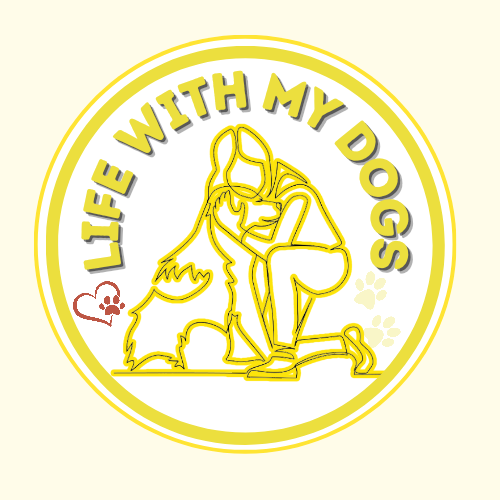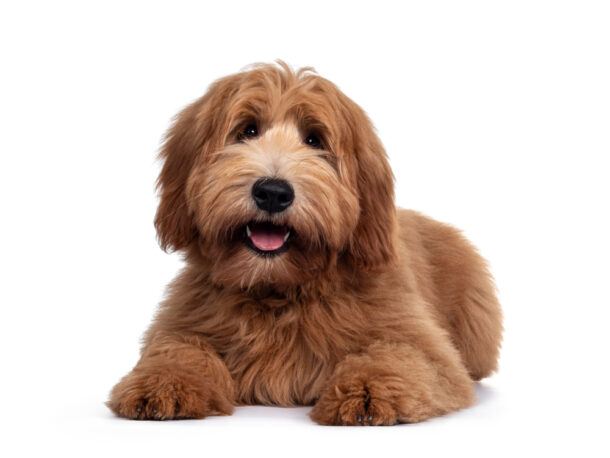LifeWithMyDogs is supported by our audience. When you purchase through one of our links, we may earn a small affiliate commission. As an Amazon Associate I earn from qualifying purchases. Your cost is not affected.
**********
Seeing my senior dog coughing after drinking water was alarming. At first, I thought it was temporary, but his coughing became more frequent as the days passed. This concerning behavior had me reading into senior dog health, eager to understand what was happening to my beloved furry friend. Seeking advice from professionals, I discovered that coughing in senior dogs can signal various issues, from benign to severe.
Recognizing the signs and taking appropriate action to learn, practice, and apply them to our everyday routine is such a worthwhile journey. Understanding the causes and following the applicable techniques have greatly relieved me and made aging a wonderful experience for my senior dog.
A Comprehensive Guide in Managing Coughing in Senior Dogs
Observing an older dog coughing after drinking water can be a concerning signal for pet owners. While this behavior is sometimes normal due to the water going down the wrong way, it may also indicate age-related health complications.
Senior dogs can exhibit different types of coughs, with various potential underlying causes ranging from benign to more serious conditions that warrant attention. As dogs age, they become more susceptible to respiratory issues, and a cough can be a symptom of such problems.

It’s crucial to closely monitor when coughing occurs and the nature of the cough, as it can significantly aid in diagnosing the issue. For example, a dry cough could point towards illnesses like kennel cough, while a wet, phlegmy cough might suggest the presence of fluids in the airways, such as in cases of pneumonia or bronchitis.
Recognizing the specifics of the cough, alongside other symptoms such as changes in behavior or appetite, can help address your senior dog’s health more adequately.
Key Takeaways
- Coughing in senior dogs after drinking water could indicate a range of respiratory issues.
- The type and frequency of cough provide important clues for diagnosis.
- Monitoring and understanding these symptoms is critical for the health management of aging dogs.

Understanding Canine Aging and Respiratory Issues
As dogs grow older, their bodies undergo physiological changes that can affect their respiratory system. This section delves into the aging process of dogs and the respiratory conditions that are frequently encountered in their senior years.

The Aging Process in Dogs
The aging process in dogs leads to a natural decline in organ function and immunity. Senior dogs often experience a decrease in lung elasticity and airway defense mechanisms, rendering them more susceptible to respiratory issues.
Metabolic changes also play a role, as they can affect the overall health of an aging dog, potentially exacerbating respiratory conditions.
Common Respiratory Conditions in Senior Dogs
Respiratory conditions in senior dogs range from mild to severe. Some prevalent issues include:
- Infectious Diseases: Conditions like kennel cough or pneumonia can lead to coughing due to bacterial or viral infection.
- Chronic Conditions: Aging dogs might encounter chronic conditions like a collapsing trachea, particularly in small breeds, or heart disease which can manifest with symptoms of coughing as detailed in insights on heart cough.
- Airway Issues: Brachycephalic breeds, those with short noses, are prone to airway issues; and laryngeal paralysis can occur as a part of the aging process.
Why Senior Dogs Cough After Drinking Water
Senior dogs often experience bouts of coughing after drinking water due to a range of physical causes or more severe conditions like aspiration pneumonia.
Physical Causes of Coughing
- Drinking Too Quickly: When dogs drink too fast, they may inadvertently inhale water into their trachea, leading to a cough reflex.
- Age-Related Changes: The muscles of the esophagus can weaken with age, making it difficult for older dogs to swallow water properly.
- Dental Issues: Painful dental problems may disrupt normal drinking patterns, causing coughing as water misdirects into the airway.
Aspiration Pneumonia Explained
Aspiration pneumonia occurs when a dog inhales foreign matter, such as water, into their lungs, leading to an inflammatory reaction. Symptoms include a persistent cough, difficulty breathing, and lethargy.
It’s critical for pet owners to seek veterinary care if they suspect their senior dog has developed this condition.
Diagnosing Cough in Senior Dogs

When a senior dog coughs after drinking water, it’s critical to discern whether the cough is a harmless incident or indicative of a more serious condition. A proper diagnosis involves a thorough veterinary assessment and a series of diagnostic tests.
Veterinary Assessment
Veterinarians begin with a comprehensive physical examination of the dog, observing its overall health, behavior, and respiratory sounds.
It is essential to relay information about the dog’s cough, including the frequency and nature of the cough, to the vet. They may inquire about the dog’s history and recent activities to identify potential environmental factors or stressors.
Diagnostic Tests and Procedures
After the initial assessment, the vet may recommend various diagnostic tests to pinpoint the cause of the cough:
- Blood Tests: These can reveal infections, inflammation, or organ function.
- X-rays: Imaging of the chest may show issues like bronchitis or heart enlargement.
- Endoscopy: A visual inspection of the airways can detect abnormalities or foreign bodies.
- Heartworm Test: To rule out heartworm disease as a cough cause.
Each test provides valuable information that contributes to an accurate diagnosis, which is crucial for determining the appropriate treatment and care for a senior dog experiencing cough initially triggered by drinking water.
Treatment for Coughing in Senior Dogs
When an older dog starts coughing after drinking water, it’s important to identify the cause and provide the appropriate treatment. This section will guide you through home care strategies and medical interventions that can help alleviate your dog’s cough.

Home Care Strategies
- Elevate Food and Water Bowls: Raising bowls to align with your dog’s throat can help prevent water from going down the wrong pipe.
- Slow Feeding and Drinking: Introduce a slow feeder or water dispenser to reduce the chance of choking and coughing.
Medical Interventions and Therapies
- Veterinary Assessment: A thorough veterinary check-up can determine if the cough is due to a minor irritation or a more serious condition, such as heart disease or respiratory infection.
- Medication: If an infection is present, your vet may prescribe antibiotics or cough suppressants.
- Specialized Treatments: In cases of heartworm or other parasitic infections, specific treatments directed at the parasite may be necessary.
It is imperative to closely monitor your dog’s symptoms and consult a vet if the cough persists or worsens, as they can provide a personalized treatment plan tailored to your dog’s unique health needs.
Preventive Measures and Tips
Proper techniques and adjustments can significantly reduce episodes of coughing in senior dogs after drinking water. The following strategies are aimed at optimizing hydration and incorporating beneficial lifestyle changes.
Hydration Techniques
- Elevated Bowls: Raising the height of drinking bowls can align a dog’s posture more naturally, reducing the risk of aspiration.
- Controlled Pace: Utilizing slow-feed water bowls or inserting a floating object in the water can encourage a dog to drink more slowly and help prevent gulping air.
Diet and Lifestyle Adjustments
- Consistent Exercise: Keeping a dog’s weight in a healthy range can reduce strain on the respiratory system.
- Measured Feeding: Splitting meals into smaller, frequent portions can prevent overeating that might influence a dog’s breathing and drinking pattern.
When to Consult a Veterinarian
If an older dog is coughing after drinking water, it may be a minor issue; however, certain circumstances warrant prompt veterinary attention. Owners should observe their dog’s general condition and cough characteristics to decide when a visit to the veterinarian is necessary.

- Persistent Coughing: If the coughing is not an isolated event and continues over an extended period.
- Coughing with Additional Symptoms: Accompanied by other signs such as wheezing, nasal discharge, or fever.
- Changes in Behavior or Appetite: Diminished interest in usual activities or a decrease in appetite.
A veterinarian should also be consulted in the following cases:
- Intense Coughing:
- If a dog seems distressed or the coughing is severe and forceful.
- Coughing Fits:
- Occurrences where coughing leads to gagging or a noticeable struggle for air.
- The dog has a pre-existing condition such as heart disease.
- There’s a risk of a foreign object obstructing the airway.
- Symptoms of potential serious illness, such as pneumonia or kennel cough, are present.
Taking Action: Addressing Coughing in Senior Dogs

The journey of managing coughing in senior dogs has been an eye-opening experience. Recognizing the specific type of cough and understanding the underlying causes is the beginning of ensuring the best care for our senior dogs. Every small action can make a significant difference in their quality of life, from elevating their water bowls to consulting with a vet. If your senior dog is experiencing persistent coughing after drinking water, don’t wait—seek veterinary advice to diagnose and address the issue. Let’s ensure our beloved furry friends enjoy their senior years with the health and comfort they deserve.
Frequently Asked Questions
In managing the health of senior dogs, understanding the nuances of their symptoms is crucial. This section addresses specific questions related to coughing in senior dogs post-water intake, including causes, treatments, and when to seek veterinary attention.
What can be done to alleviate coughing in senior dogs after they drink water?
Ensuring that older dogs drink water slowly can help reduce coughing episodes. Owners might consider providing shallow bowls or using water fountains designed to slow down the rate of drinking.
What are common treatments for older dogs that cough post-drinking?
Treatments often include adjusting the dog’s posture during drinking, providing cough suppressants, or using anti-inflammatory medications. These medications should be prescribed by a veterinarian if the cough is persistent.
What might be the cause of a senior dog coughing only after hydration, but not after eating?
A senior dog coughing exclusively after drinking water might be experiencing a condition like laryngeal paralysis or collapsing trachea. These are conditions where the mechanics of drinking water specifically trigger the cough reflex.
How should one address gagging in dogs following water intake?
If a dog is gagging after drinking water, they should be observed for frequency and severity. Modifications to drinking habits or consulting a veterinarian can help determine if there’s an underlying issue that needs treatment.
Could a persistent cough after drinking water in older dogs indicate a serious health issue?
Persistent coughing after drinking water in older dogs could suggest health problems such as respiratory infections, heart disease, or airway issues. A veterinary consultation is recommended if coughing is ongoing or worsening.
What signs indicate potential tracheal collapse in senior dogs, and how is it staged?
Signs of tracheal collapse in senior dogs include a honking cough, difficulty breathing, or a cough that worsens with excitement or exercise. Staging, typically done through imaging, assesses the degree of collapse and helps guide treatment decisions.
Explore Canine Care & Community!
Discover engaging content, product reviews, and connect with a passionate community dedicated to canine care and companionship! Follow us on Facebook, Instagram, Pinterest, Twitter, and Youtube, for expert insights and adorable dog moments. Join our pack now!


